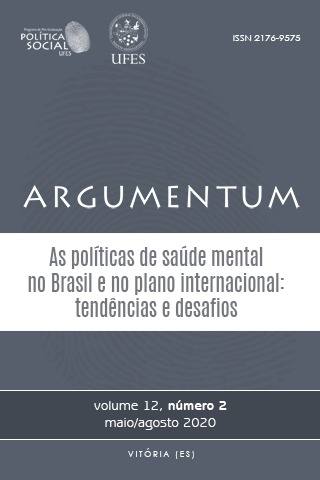Psychiatric Agencies in Brazil: Psychiatric Reform and the Psychotropic Epidemic
DOI:
https://doi.org/10.18315/argumentum.v12i2.29114Abstract
This article presents a sociohistorical analysis of mental health policies in Brazil, by means of examining two distinct movements: the links and development of Brazilian Psychiatric Reform and the expansion of a psychiatric practice strongly connected to the pharmaceutical industry. Firstly, it describes the evolution of these two movements, based on the framework of historical sociology. Secondly, it presents the analysis of data based on the Theory of Structuration by Anthony Giddens, which shows how the expansion of the use of psychotropics has developed within the structures and services created under Psychiatric Reform policies, in a process of coexistence. Brazilian Psychiatric Reform has not opposed the development of an epidemic of the use of psychiatric medication.
Downloads
Downloads
Published
How to Cite
Issue
Section
License
Copyright Transfer Agreement
As a condition for submission, the authors must agree with the Copyright Transfer Agreement, by checking the box after reading the clauses.
The author(s) (hereinafter "AUTHOR") hereby agrees to transfer, without any financial compensation, the property of copyrights regarding Argumentum, a journal of the Postgraduate Program in Social Politics (Programa de Pós-graduação em Política Social), Federal University of Espírito Santo (Universidade Federal do Espírito Santo) - Av. Fernando Ferrari, 514 - Goiabeiras 29075-910, Vitória (Brazil), (hereinafter "ARGUMENTUM"), according to the following terms and conditions:
1. I am aware of the terms of "Care Ethics Research Guide" described in the Policies section.
2. AUTHOR warrants to be the writer and copyright holder of the WORK submitted.
3. AUTHOR declares that the WORK does not infringe the rights of third-parties; that the distribution of images (if existent) was authorized; and that AUTHOR assumes total moral and property responsibility for their content.
4. AUTHOR agrees to transfer all the copyrights concerning the WORK to ARGUMENTUM, especially the rights to edit, publish, translate into another language, and reproduce it through any process or technique. ARGUMENTUM becomes the exclusive owner of the rights regarding the WORK, and any total or partial reproduction, in any other medium, printed or electronic, is strictly forbidden without prior written consent by ARGUMENTUM.
5. The copyright transfer is unpaid and, therefore, there will be no monetary compensation whatsoever by ARGUMENTUM in order to use the TEXT.

